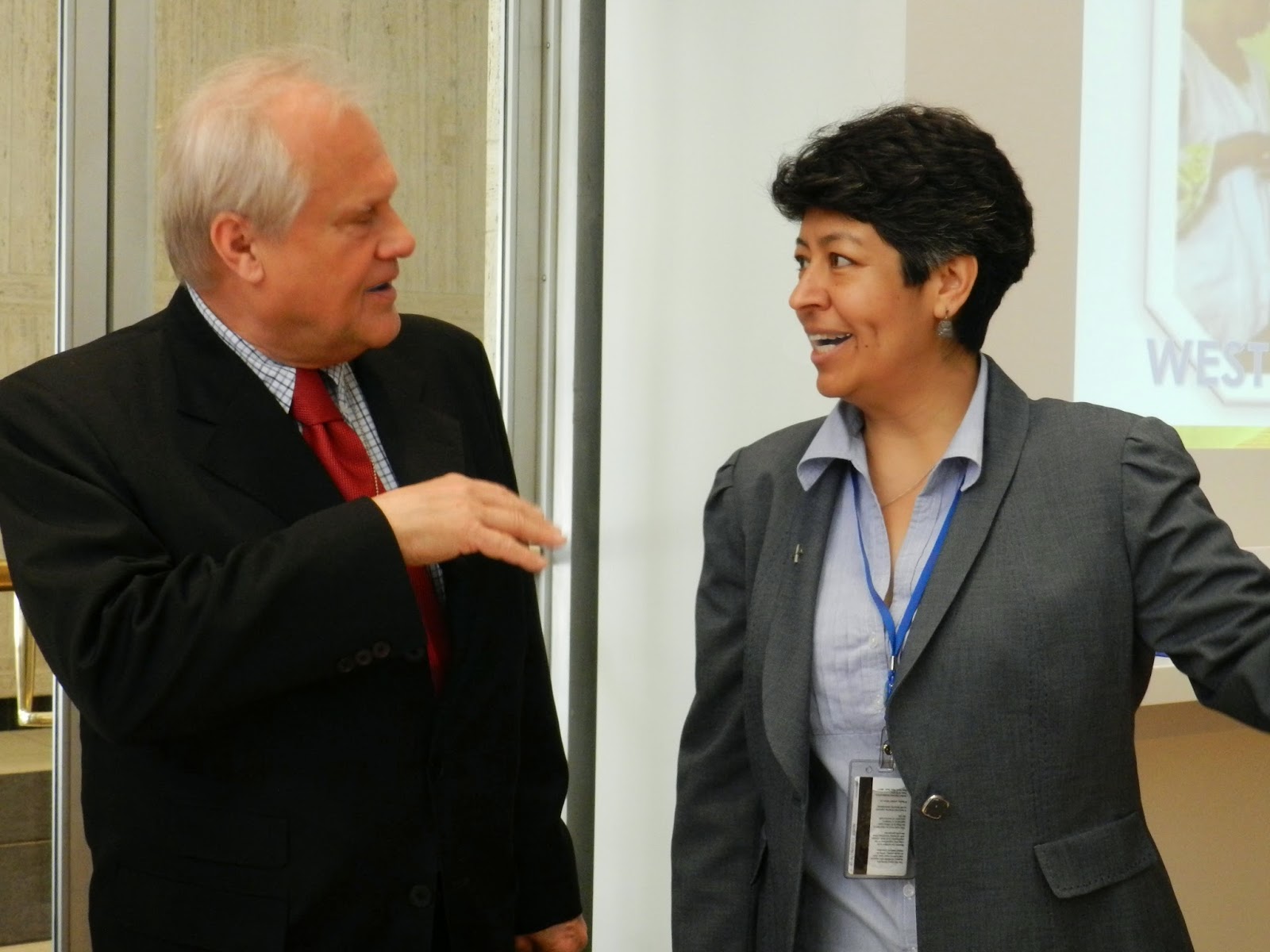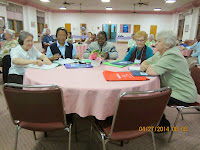Afternoon questions for small discussion groups (gathered into common language groups):
Question #1:
Quels sont les domaines que les Soeurs de St Joseph devraient aborder ?
¿Cuáles son los asuntos que las Hermanas de San José deberían abordar?
What issues do Sisters of St. Joseph have a special voice for?
Question #2:
Auxquels domaines ou problemes avons nous accès pour avoir l’information ou avoir une meilleure perspective?
¿A cuáles asuntos o problemas tenemos acceso especial en cuanto a la información o para tener una mejor perspectiva?
What issues or problems do we have special access to information or a privileged perspective on?
Question #3:
Quelles sont les personnes cles dans notre pays? Qui sont les partenaires cles avec lesquelles nous devrions travailler?
¿Quiénes son las personas claves en nuestros países? ¿Quiénes son los mejores colaboradores con que deberíamos trabajar?
Who are the key people in our countries? Who are the key partners we should work with?
Question #4:
Comment abordons nous les domaines ou problemes en termes des “Droits de l’homme”?
¿Cómo podemos abordar estos asuntos o problemas en términos de “derechos humanos”
How do we talk about these issues or problems in terms of “human rights”?
Question #5:
Cooment pouvons-utiliser les instruments des Nations Unies, comme l’EPU (Examen Periodic Universel), les Rapporteurs Speciaux, le Conseil de Droits de l’Homme?
¿Cómo podemos utilizar las herramientas de la ONU, por ejemplo: Los relatores especiales, el Consejo de Derechos Humanos?
How can we use these UN tools, like UPR, Special Rapporteur, Human Rights Council?
Responses from the groups:
Marissa (Argentina): Tragic and terrible. At first we had anxiety, a number of difficulties with the website, we couldn’t get it to work nor was it very user friendly. So we need to verbalize and express what happened for each one of us and what we understood. We thought we all understood the same but then realized we each had a different understanding. So we needed Griselda to be with us to give some concrete examples. So she explained how the mechanism of the UN works together in terms of how things are done. [Griselda takes over as the airline called about her lost suitcase].

Sr. Nilva (Brasil): After that tragic, comic experience, we did discover some of the tools available on that website. We discovered where the recommendations were located, who made them, which were accepted and rejected. We talked about the process at the grassroots level and how to move up to the higher levels and how to work with that process, then how to go back to the grassroots. It became concrete for us because Nilva was able to look at what was happening in her country and she found a summary of recommendations, those accepted and rejected, and what happened. So from there it was easier to see how to move from the standpoint of advocacy and lobbying at different levels. Where those embassies in terms of ours in relationship to other NGOs and through all the other Federations of the Sisters of St. Joseph. Everything is interconnected and we almost achieved it.

Sr. Anita (India): We spoke about our problems in India. 75% percentage of population lives in countryside and depends upon agriculture. We mostly do the natural process of agriculture. We don’t know from where these multinational corporations came from and the GMOs (genetically modified organisms). We don’t need any companies help or additions. These companies and the GMOs they appear in Indian countryside and everything has changed. They took control of our own seeds, the farmers and the land. We actually keep the seeds after the harvesting is over. But now we cannot keep anything with us because of these companies and genetically-modified seeds. Due to this company, all in Southern and Northern parts of India we have lost many fruit products and even farmers are committing suicide. It still continues and we say no to it. Still multi-national companies are strong. It was proposed to modify, genetically, a vegetable called prinja. We, the students, the farmers, the church leaders, almost the whole nation, were protesting against it, and we want none of it. We don’t know how long it will be. And the farmer says, “We don’t want any GMOs in India.”
The second thing, being a large country, full of rivers and natural resources, we actually do not utilize them carefully. But the companies buy our waters and deprive us from drinking water and utilizing them freely. We never had this kind of problem of only being able to get drinking water from purchasing it. The nuclear power plants and thermal plants - we actually do not need all these things, but in the name of development, the lands of the poor people are grabbed, there comes deforestation, they pollute the waters, everything is disturbed. ...
But as we Sisters of St. Joseph can join the global sisters, the NGOs which are really interested, same like us, and the signature campaign in the local, national and international levels. We can also cooperate with the press and doing a lot of paperwork, to inform everyone to know that what we are really going through and what we are really doing. I think our group believed that development doesn’t mean having everything, but we should live in communion with nature, fellow human beings, without having any racial, gender bias or caste and giving good health to everyone and eradication of poverty and everything that does good to human beings and nature.

Sr. Joan (Canada): We had a very good discussion with US issues, Australian issues and Canadian issues. Our first step is that we have to try to - I think at the beginning we are trying to struggle to get to one or two issues we can agree on. So we sought some help as we had different understandings at the table about the task we were to engage in. We liked the human rights framework to do an analysis of just about any issue we had identified and recognizing different capacities on the home front to analyze issues. So then we talked about the importance of building networks and gave some examples that were successful. And, then talked about how important it was to find vehicles to share our work as a CSJ justice committee. Again, recognize perhaps we need to find resources to get a savvy young person to help us share our work in different countries, perhaps more effectively using the website and other vehicles of social media. We talked about issues from human trafficking, immigration, resource extraction, the economy, poverty and we can’t take them all on so we didn’t quite get far enough to find those vehicles other than we like the framework.

Sr. Jeanette (Chad/Algeria): Here it is - we were talking together, for us this was a new discovery, this UPR (Universal Periodic Review, a tool at the UN). We mentioned that in order to use an instrument or mechanism we need to know it better. This for us involves information communication and follow-up. We also spoke about education around this new mechanism. So in order to discovery the situation and needs we have to discern and don’t know always how to do that. Because governments are always going to say or show something that is good for them, they are always going to show that good side (as the Sister was saying about GMOs). We also talked about the work at the grassroots level. They also gave an example from Madagascar of how the lands are taken out from under them for purposes of mining. So the question came up that whenever these situations arise should we go to the government or should we go to the NGO. We said that because we are at the grassroots level we need to bring the voices of the grassroots community. For us it’s very helpful to know more about the NGO so that at the NGO we’ll be able to participate in more advocacy and lobbying. We also spoke about the importance about building up that network, especially as Sisters of St. Joseph. Would anyone like to add anything?

Sr. Mimose (Haiti): From the beginning we had talked about this new mechanism - UPR - and it is something new for us. This will help us to become more informed about the treaties that our government has signed. And we are trying to carry out how we can better help the people and become better informed and organized.

Sr. Graziella (Italy): Our table was very small, a few people. We were immediately aware of the lack of knowledge that we had. And so the first thing we had to do was to increase our knowledge and understanding of what we were about. It was very interesting and important for us to know our reality through the documents that come to us through the UN. And we tried to see how we can insert ourselves into the larger reality. Our justice & peace group in Italy is just beginning, it is just a seed, just beginning to take shape. In order to really move and do more and have a wider influence, we need to begin to raise our own awareness and teaching other people the same thing. So that we will be able to move together with the Sisters and then to move with the laypeople we are working with. The second aspect is organization. ... So first of all we need a linker amongst ourselves, asking our Sisters in other countries to begin collaboration in other countries where they find themselves. Then we really need to come to know the reality, analyze it, and then move towards action. Working in each place, with other groups, who are working on these things as well. Up to this time we have worked on those themes and issues that have been raised in other international meetings. They are interpretative creation, violence against women, and immigration for us. We continue to work on these same topics. That’s it - grazie.

Sr. Sue (Canada): Well, Ken was taking notes for us but he wouldn’t speak for us. I have a few threads, so others can add. We started talking about the UPR process and we focused on the dialogues that can be created back in our home country. So we like the idea of using the process to create attention in the media or have grassroots dialogue about the issue and raise awareness that way to in order to create momentum for change. We talked about our strength as religious orders, from our perspective, in our ability to mobilize the grassroots, to stir awareness and dialogue, and the special role we can play in political advocacy, first because our congregations have built up a lot of credibility, based upon the history of our work in school systems, healthcare, or other areas. Also, politicians see us as a group that comes to talk about issues without a personal agenda. We talked about immigration and migrant workers, the hypocrisy of globalization (products, consumer goods, money can cross borders freely, but not people). We made links here with what is happening in each of our countries so we may know where we might collaborate with each other, where what is happening in Haiti might be something I want to bring to my government. We also made links to the Convention on the Rights of Migrant Workers. That’s an area where no country who actually receives migrant workers has signed on to it, only countries that send migrant workers have signed on to it. So that’s an area where many of us here have work to do with our own governments before anything can happen at the UN.




















































